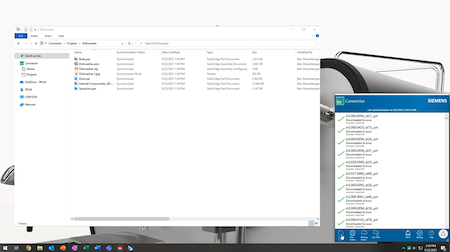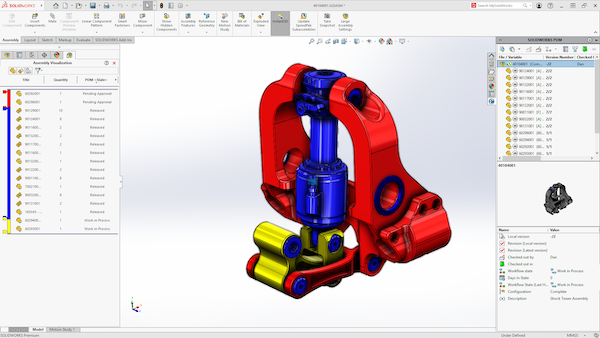Throughout this blog series, we have learned how Siemens has advanced the ways in which OEM manufacturers and suppliers collaborate on new product development, from generating RFQs to conducting design for manufacturing (DFM) analyses to assembling more accurate tooling cost estimates — all using real-time data shared and stored on the cloud in the NX Mold Connect app.
Oscar, the OEM’s design manager, and Samantha, a lead salesperson for the mold manufacturer, have successfully used NX Mold Connect to work together on the design of a new power drill housing, using the DFM and RFQ tools within the app to optimize how the product is designed and how the mold will be built. Now, they are moving forward with the project and using Siemens’ Connector to manage workflows in the cloud versus bogging down their desktop systems as they work with very large data files to get this project into production.
Full Access; No Megabytes
As discussed in the previous blogs, NX Mold Connect provides users with full access to critical tools used in product development without the need to invest in expensive, megabyte-heavy software programs and the equally pricey hardware needed to support them. Users can instead store their data securely on the cloud and, with a simple click on a link, can open the NX tools and data files in their internet browsers.
Since subscribing to NX Mold Connect, Samantha and her team are impressed with the convenience and speed at which they can load, review, and work on project files on their desktops using essential apps on the cloud. When they are finished working in a file, they simply upload it to the cloud where it is stored safely until they need it again.
There are two options for saving the data files to the cloud. They can either be uploaded manually through the internet browser or synced up using the Siemens Connector. The Connector is a plug-in that is installed on the desktop and allows users to drag and drop files on their computer to a folder that automatically syncs them up to the cloud and makes them available in NX Mold Connect.
The Connector Plug-in works seamlessly so that users can share data immediately. Image source: Siemens. Click image to enlarge.
Seamless and Secure Collaboration
Because the Connector plug-in works seamlessly, Samantha and Oscar can collaborate more efficiently using files they know are up-to-date, organized, and secure. No file sharing via email is required and that ensures the correct files are being shared and worked on by authorized users. This benefits their individual teams as they work collaboratively on project files together. Because the upload happens asynchronously, time waiting for downloading or uploading of files is reduced to almost nothing, which helps make project management more cost effective and enables more work to be completed each day.
In addition, the files used in NX Mold Connect are in the same format as files used in NX on the desktop, so Oscar and Samantha can open their NX data files without the need for any translation. Files that are updated to modify geometry in NX based on design feedback are seamlessly synced up to the cloud after the changes are saved, ensuring that both Oscar and Samantha are working on the latest version of the files. When the job is awarded, Samantha can continue with designing the mold in NX. No translation means she can also easily share files with Oscar at any time, quickly, by sending him a message within NX Mold Connect.
In conclusion, accelerating the RFQ process using NX Mold Connect helps Oscar cut down his design cycle time and focus on designing great products instead getting mired in emails and file transfers while manually managing the quotations. By the same token, NX Mold Connect makes it possible for Samantha to speed up the RFQ process so she is able to increase the total number of quotations that she can provide to Oscar and other customers and increase the number of jobs won, ensuring the success of her company. Both the OEM and suppliers recognize that NX Mold Connect strengthens their relationship and moves it to a higher, more streamlined level.

Searching for more information about Product Design & Manufacturing?
Click here!
Cynthia Kustush
Cynthia is the former senior editor of MoldMaking Technology Magazine. Currently she is a freelance author specializing in manufacturing, particularly for the metalworking and plastics industries. The daughter of a mold manufacturer, Cynthia “grew up in the trade,” and for many years has been actively involved in organizations such as the American Mold Builders Association (AMBA) and the Society of Plastics Engineers (SPE). She resides in Chicago’s western suburbs.
View All Articles





Share This Post